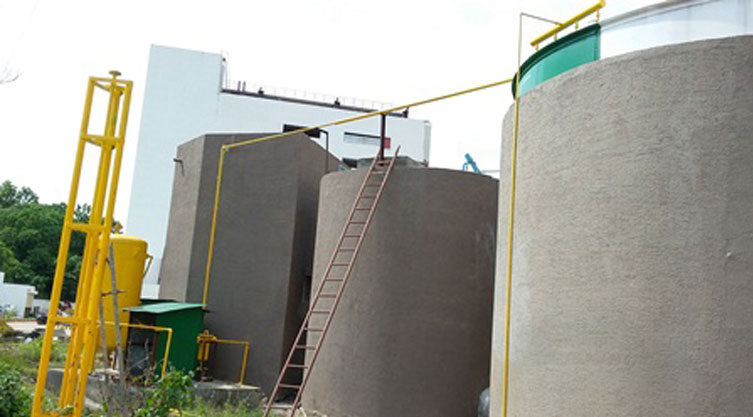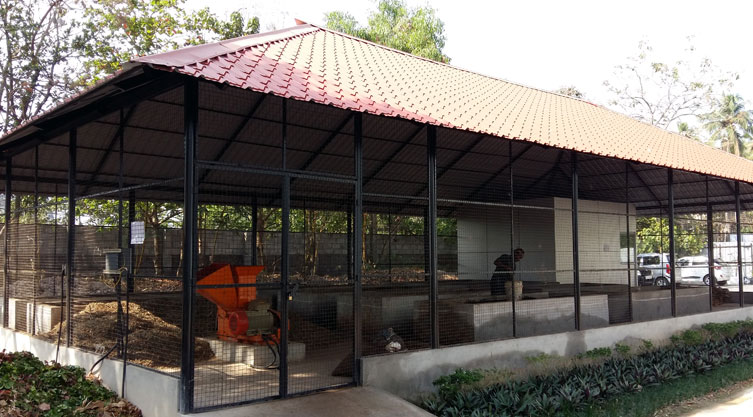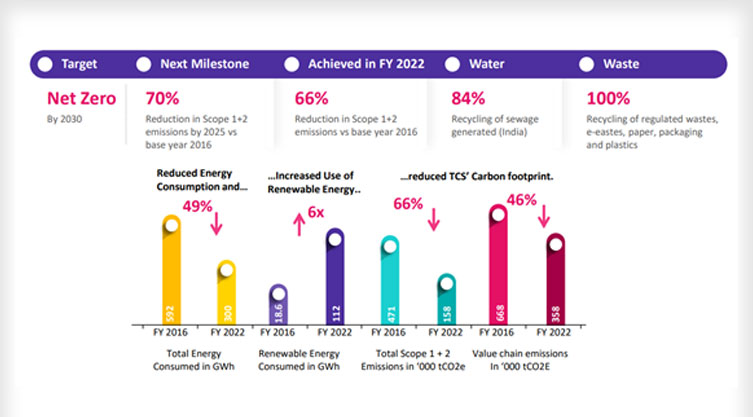December 2022 | 1,847 words | 7-minute read
$50 billion in revenue by 2030 with a net zero carbon footprint by the same year — Tata Consultancy Services (TCS) has set itself a green growth aspiration. This aspiration is based on the company’s commitment and belief that it can strengthen its business while also being responsible towards the environment and its ecosystem.
"TCS’ vision is to decouple business growth and ecological footprint from its operations to address the environment bottom-line. The green approach is embedded in our internal processes and services offerings. From green buildings to green IT to a green supply chain, our mantra is to grow sustainably and help our customers achieve sustainable growth through our green solutions and service offerings," says N Chandrasekaran, Chairman, Tata Sons.
The global call for action
The Paris Agreement 2015 legally binds signatory countries to limit global warming to well below 2° Celsius, preferably to 1.5°C. The Intergovernmental Panel on Climate Change’s (IPCC) — the world’s foremost experts on climate science — has confirmed that to achieve this greenhouse gas (GHG) emissions must halve by 2030 and drop to net zero by 2050.
The Glasgow Climate Pact, signed at COP26 (UN Climate Change Conference 2021), reiterated this by urging countries to move “towards just transitions to net zero emissions by or around mid-century, taking into account different national circumstances.” Here, India pledged net zero emissions by 2070.

In addition, the UN Decade (2021-2030) has been identified as the critical decade to act. In building a resilient, zero-emissions economy and strengthening the global response to the threat of climate change, business has a vital role to play. TCS’ net zero transformation commitment recognises this urgency and is aligned to the decarbonisation roadmap of India and the world.
The decarbonisation commitment
TCS is focussed on integrating sustainability into its business decision-making and business models to reduce its carbon footprint while it prepares to double its size in the coming decade. In May 2021, the company set out a new carbon reduction goal: to reduce its absolute GHG across Scope 1 and Scope 2 by 70% by 2025 (over 2016 base year), and to achieve net zero emissions by 2030.
"From green buildings to green IT to a green supply chain, our mantra is to grow sustainably and help our customers achieve sustainable growth through our green solutions and service offerings." - N Chandrasekaran, Chairman, Tata Sons.
This target is a result of systematic purpose-driven steps taken by the company early in its environment stewardship journey. “We began our environmental sustainability journey in 2006 when responsible corporate citizenship was still a new concept in the Indian IT industry,” says Dr Aniruddha Agnihotri, Head, Environmental Sustainability, Health and Safety, TCS. “By embracing the precautionary principle, TCS recognised environmental and carbon footprint mitigation as a key priority area.”
He adds, “Our ambitious net zero target, which is ahead of the 2050 target of the Paris Agreement and the 2070 commitment of India, builds on the company’s achievement of meeting its FY20 target by FY18 — reducing our specific carbon footprint by half (over baseline year FY08). In fact, by FY20, we reduced our specific carbon footprint by 61% (over the baseline of 2008).”
The strategy framework
TCS is certified under the ISO 14001:2015 Environmental Management System standard across 124 locations globally. The management system has integrated environmental, including climate change, risks and opportunities with TCS’ business strategy.
TCS’ strategy towards achieving its net zero ambition has four focus areas — energy management, carbon footprint reduction, water management and waste management. Recognising these as the most material environmental aspects of its operations, the company measures, manages and reports these as a responsible corporate citizen.
“Our ambitious net zero target, which is ahead of the 2050 target of the Paris Agreement and the 2070 commitment of India, builds on the company’s achievement of meeting its FY20 target by FY18," - Dr Aniruddha Agnihotri, Head, Environmental Sustainability, Health and Safety, TCS
To enable reduction in its scope 1, 2 and 3 emissions across these areas, the company is implementing energy efficiency across operations, expanding use of renewable energy sources (onsite generation and procurement), working with supply chain partners to reduce value chain emissions, and optimising emissions from business-related travel.
Energy and carbon
As an IT Consulting Services and Business Solutions company, TCS’ operational footprint consists largely of office campuses. “In FY22, our Scope 1 emission from direct GHG sources was 10.6% of the total Scope 1 and Scope 2 carbon footprint,” says Dr. Agnihotri
A major part of the company’s carbon footprint arises from indirect, or Scope 2 emissions associated with purchased electricity for the functioning of these campuses and the IT infrastructure there. In FY22, 89.4% of emissions across Scope 1 and Scope 2 were due to purchased electricity for office blocks. The primary carbon mitigation driver in TCS’ journey to net zero is, therefore, reduction of energy consumption and switching to renewable sources of energy on campuses.

“All new campuses owned by TCS are designed according to green building standards,” adds Dr Agnihotri. In FY22, 34 TCS offices, spanning over 28.2 million sq ft of office area, were certified by the Indian Green Building Council. These make up over 64.4% of the company’s real estate portfolio in India.
To ensure operational energy efficiency, the company has taken up projects like replacing fluorescent lights with LED lamps, increasing the set temperatures in offshore delivery centres and server rooms, and upgrading legacy heating, ventilation and air conditioning systems with state of-the-art technology. “We have connected heterogenous systems like energy meters, BMS systems, occupancy systems etc, on a single platform using TCS’ IoT-based Remote Energy Management System (TCS Clever Energy TM) to effectively measure, monitor, analyse and optimise energy consumption on a real-time basis with the aim of reducing carbon emissions,” says Dr Agnihotri.
Its Green IT initiatives focus on energy optimisation across its data centres, equipment rooms and delivery centres to minimise the negative effect of its IT operations on the environment. “In FY22, we undertook data centre and equipment room efficiency projects at two of our premises in Mumbai and Chennai. Over 20 UPSs and 30 cooling units were replaced with energy-efficient systems and models, leading to the achievement of a power usage effectiveness (PUE) of 1.65,” says Dr Agnihotri.

He adds, “TCS is also committed to improving the renewable energy mix in its energy portfolio.” This includes strengthening onsite generation of renewable energy. In FY22, the company augmented rooftop solar photo voltaic installations, taking the total installed capacity to 10.2 MWp. This contributed to 3.76 percent of total electricity consumed during the year. The company also increased its renewable energy procurement at its Siruseri office in Chennai and switched to green tariff for its operations in Karnataka and Maharashtra. With these, TCS not only saw the company’s use of renewable energy increase to 37.2% of its total energy use in FY22, but it also clocked a 49% reduction in energy consumption (over the base of 2016). The renewable energy used in FY22 was 6 times more over 2016.
Water and waste management
The company is optimising its water consumption and improving its waste management practices to reduce its Scope 3 emissions. All new campuses have been designed for 50% higher water efficiency, rainwater harvesting and 100% treatment and recycling of sewage.
TCS has set a target of 3% y-o-y reduction in freshwater use across campuses till FY25
“We have set a target of 3% y-o-y reduction in freshwater use across campuses till FY25,” says Dr Agnihotri. 5.2% of water utilised in FY22 was from rainwater harvesting. 84% of the sewage generated across the campuses in India in the same period was recycled.
TCS also aims to reduce waste generation and maximise recycling/reuse to divert waste sent to landfill. In FY22, the company achieved 100% recycling of regulated wastes, e-waste, printer cartridges, paper, packaging and plastics. It treats biodegradable waste onsite for biogas recovery or manure generation through biodigesters or composting. On-site food waste management facilities have been installed across TCS facilities and use of single-use plastic has been eliminated.
In total, the value chain emissions saw a 46% reduction in FY22 over 2016.
Empowering the extended ecosystem
Beyond greening its operations, the company is empowering its employees to become change agents through year-round environment awareness programmes. “We have designed and deployed a tool called Circle4Life, which helps individuals account and track their own personal carbon and environmental footprint,” says Dr Agnihotri.
TCS also supports various voluntary national and international protocols, conventions and agreements on environment and proactively engages with governmental and other agencies in designing and driving environmental policy and regulations. It is driving industry and corporate-led climate change mitigation programmes as a member of industry bodies like NASSCOM and CII. It recently won the Climate Action Plan (CAP) 2.0 award in the ‘Resilient’ category, by the CII-CESD, recognising its business actions in combating climate change.
On track
As of FY22, “We have already achieved 66% reduction in Scope 1 and 2 emissions in FY22 (over a 2016 baseline) towards our 2025 goal,” says Dr Agnihotri. “In fact, TCS APAC (excluding Japan), Europe and North America have become carbon neutral across Scope 1 and Scope 2 emissions in FY22, which was assured by Bureau Veritas India Limited in line with PAS 2060:2014 standards.”

The company’s proactive stance on climate change and award-winning work with communities across the world have earned it a place in leading sustainability indices like the FTSE4Good Emerging Index. As per the EcoVadis sustainability assessment in 2022, TCS has been categorised as ‘Advanced’ with respect to its sustainability performance and is among the top 5% of the companies in the IT sector.
“We have designed and deployed a tool called Circle4Life, which helps individuals account and track their own personal carbon and environmental footprint." - Dr Agnihotri.
The company is now gearing itself for the next big steps in its net zero journey. Dr Agnihotri says, “We have embraced the global Science Based Targets initiative, further aligning our net zero journey to the Paris Agreement goals. We are working on aligning our emissions reduction targets grounded in climate science..

TCS’ sustainable transformation is also in line with Aalingana, the Tata group’s sustainability roadmap and the aim to be net zero by 2045. “TCS is fully aligned to the Aalingana targets, particularly on net zero carbon emissions, waste recycling and zero waste to landfill,” adds Dr Agnihotri. “We are looking forward to leveraging synergies at the group level to meet our goals related to water neutrality and carbon offsetting, thereby meeting the overall aspirations and commitment of the Tata group."
TCS is aligned to the 5-point set of national targets set at COP26
- India will increase its non-fossil capacity to 500 GW by 2030
In FY22, TCS augmented rooftop solar photo voltaic installations at its campuses - India will meet 50% of its energy needs from renewable sources
In FY22, the company’s renewable energy utilisation was 37.2% of its total energy consumption and is expected to increase at a faster pace - India will reduce at least 1 billion tonnes of total projected emissions by 2030
TCS has set a target of reducing its absolute carbon emissions (Scope 1 & 2) by 70% in 2025 compared to base year of 2016. Further, the company aspires to become Net Zero by 2030. - India will reduce the country’s carbon intensity to less than 45%
TCS reduced its carbon intensity per unit revenue by 85% in FY22 as against FY16 - India will achieve a net zero emissions target by 2070
TCS has set out to achieve the net zero goal by 2030, ahead of the national target
- Arushi Agrawal








